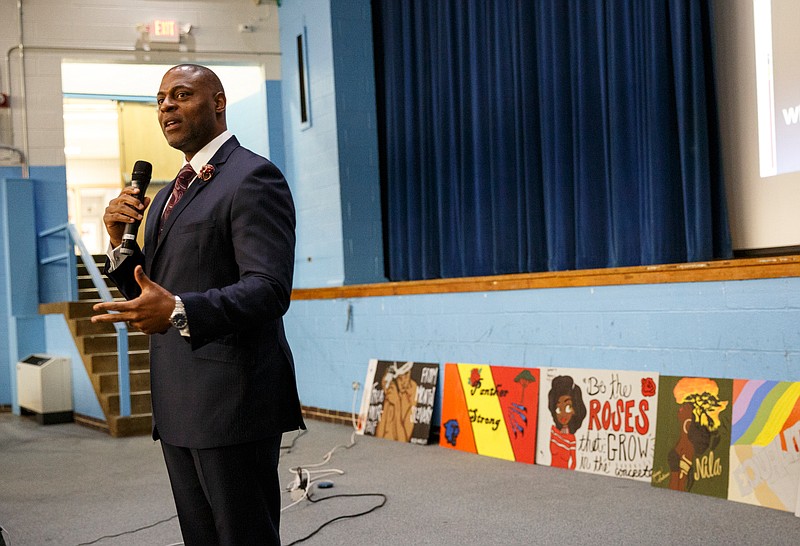Not long ago, I was driving home and passed by a construction crew working in the front yard of a neighborhood home. Six of the crewmen stood in the yard. Five were white. One was black.
Here's the thought that arose in my mind as I drove by:
"That black guy isn't in charge."
I am not proud of this thought. Ashamed, actually. But I am not surprised. Sadly, I have seen such thoughts in my mind before.
Sure, you might say, it could have been the man's body language. Or dress. Or the fact there are so few African-American contractors in this city.
But I doubt it.
The thought came from a very old place: the bias of my white Southern mind.
Biases are the thoughts we think and preferences and prejudices we make - known and unknown, conscious and unconscious - about others.
Biases, opinions and assumptions are part of our mental terrain and products of countless influences: family, peers, culture, education, politics, experience. (Despite my best efforts, my white Southern mind still contains the residue of all sorts of racist influences.)
Biases can seem like an easy way to make sense of a difficult and confusing world, yet they're both shortcut and dead-end.
Biases shortcut the necessary navigation of complexities by forming generalities, stereotypes and preferences which then can lead to damaging and false assumptions about others.
That's the dead end. Those thoughts imprison others and us.
What do you think or feel when
* An elderly, overweight woman sits next to you in the waiting room.
* Two gay men hold hands next to you on the elevator.
* The officer that pulls you over is a woman.
* Your neighbor is a stay-at-home dad.
* A white guy in a pick-up truck pulls up next to you at a traffic light.
* The man campaigning for elected office is in a wheelchair.
* The teenager taking your order wears a headscarf.
We can feel less guilty about our biases by depersonalizing them; after all, our thoughts aren't really us. (Try to control what your mind is thinking. You can't.)
Yet unexamined thoughts contain the potential for the worst of human violence; suppressing or ignoring our biases gets us nowhere.
Biases need to see the light of day. Research collected by the University of Wisconsin-Madison shows:
* "Randomly assigning different names to resumes showed that job applicants with 'white-sounding names' were more likely to be interviewed for open positions than were equally qualified applicants with 'African-American-sounding names.'"
* "Research shows that incongruities between perceptions of female gender roles and leadership roles cause evaluators to assume that women will be less competent leaders."
* "In a national study, 238 academic psychologists (118 male, 120 female) evaluated a curriculum vitae randomly assigned a male or female name. Both male and female participants gave the male applicant better evaluations for teaching, research and service experience and were more likely to hire the male than the female applicant."
See for yourself. Go online to Harvard University's Project Implicit bias quiz. (Implicit.Harvard.edu.) There are 14 simple quizzes on things like religion, gender, race, disability.
I took the quiz on gender and career.
Ten minutes later, I realized: I'm not as feminist and open-minded as I thought.
"Your data suggest a strong automatic association for Male with Career and Female with Family," the website reported.
It's important for me to know this, so my implicit preferences aren't inadvertently fueling my actions in ways that are damaging or unfair.
That's why I'm so proud of Hamilton County school leadership for recently offering training on implicit bias and white privilege.
What a gift to be able to recognize our own bias.
What an opportunity for transformation and reconciliation.
What a chance to mindfully wake up.
Of course, not everyone thinks so.
Robocalls, school board members, letters to the editor, local conservatives - many are angry at the idea of teachers being asked to consider their own preferences and bias.
"This has done nothing but create division among faculty and division among schools," one school board member said.
Nothing but division?
That simply isn't true.
But such a response is understandable.
"Something alarming happens when we think or hear the word racism. Something deep within us is awakened into fear. All of us, regardless of our race and our experience of race, get triggered," writes Ruth King in "Mindful of Race."
King's book is one wise place to begin or continue this mental, spiritual and political work.
"Racism is a heart disease," she writes, "and it's curable!"
Remember that neighborhood home? Instead of seeing that six-man crew in prejudiced and racist ways, now I have another, more lasting image: different people working to construct a new American home where more of us can belong.
David Cook writes a Sunday column and can be reached at dcook@timesfreepress.com.

